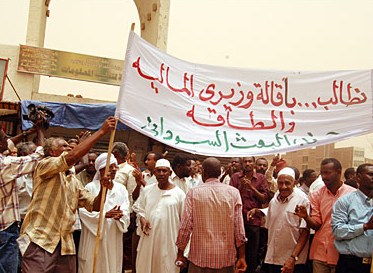Increased prices spark protests in Sudan’s capital
September 26, 2011 (KHARTOUM) – Hundreds of Sudanese citizens took to the streets of their capital Khartoum on Monday and demonstrated for hours against worsening economic conditions before being dispersed by the police, eye witnesses told Sudan Tribune.

The protestors began gathering in Buri district in eastern Khartoum, clogging traffic on main roads and burning tires. Eye witnesses said that nearly 300 protestors were chanting slogans denouncing increases in prices and calling for overthrowing the government.
As the protest gained traction, units of the anti-riot police moved in and dispersed the protestors using teargas.
Eye witnesses reported that the police had resorted to the excessive use of force and kept chasing the protestors until late hours.
A release by the police said that their forces had contained “limited riot incidents” which lasted from Monday’s afternoon until the evening in Buri area.
The police press statement reported that “a number of individuals” had gathered in Buri and blocked one of the roads leading to Al-Manshia Bridge.
The police also alleged it had refrained from responding to the protesting individuals and no injuries or losses were reported.
According to eye witnesses, security authorities had prevented journalists from taking photos of the protest and confiscated their cameras.
Sudan Tribune has also learned that the security authorities instructed local newspapers to report the facts as described in the police release and not to publish any further details.
The Sudanese government has largely escaped the wave of popular revolts which swept through the Middle East and toppled authoritarian regimes in Tunisia and neighboring Egypt and Libya.
Sudan’s economic situation has been at a tense point due to rising inflation, weakening currency and loss of oil revenues as a result of South Sudan’s secession.
Meanwhile, another bout of protests erupted in Al-Multaqa village in the Northern State, where citizens demonstrated against lack of municipal services.
A well-placed source told Sudan Tribune that the citizens called for sacking the governor of the northern state, Fathi Khalil, and censured the authorities for failing to provide them with basic services including water supply which, according to the source, led to the failure of the agricultural season and inflicted heavy financial losses on local citizens.
In an interview this week with the London-based Al-Sharq al-Awsat newspaper, Sudan’s president Omer Al-Bashir claimed that the increases in food prices were “justified,” saying that the best way to fight them is to boycott expensive food items.
The Sudanese government has been spearheading a campaign to persuade citizens to boycott red meat in protest against its high prices.
Last week the Saudi government reportedly suspended imports of red meat from Sudan over its increased prices, noting the price of lamb for instance is sold by Sudan for over $100.
Officials of Sudan’s ruling National Congress Party (NCP) accuse mainstream opposition groups of attempting to mobilize the public to rise against the government.
Public discontent with the economic situation in Sudan comes against the backdrop of flaring conflicts between the government and rebel groups in the country’s border states of South Kordofan and Blue Nile as well as in the western region of Darfur.
Click below to see video footage of the protest of Buri Lamab, an East Khartoum suburb.
(ST)
